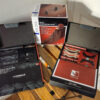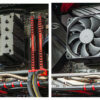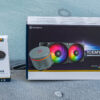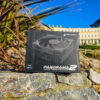
We get exited whenever we have to review small enclosures like Cooltek’s Jonsbo series, the U1. Because products like these push the limits of design and compromise. It is the smallest case we have ever reviewed thus we can’t wait to see its design and how and what it can accommodate.
First, about Cooltek:
Since 2003 they offer high quality products at very competitive prices.
The focus of their product range are high quality PC cases which always combine exceptional functionality, attractive designs and excellent product quality.
From compact HTPC solutions - such as the award-winning cases of the “CoolCube” family - to appealing to midi towers, which offer extensive features at very reasonable prices, they offer a suitable model for almost any purpose.
They take pride in drawing from ideas to continuously improve their product range.
Price when reviewed : £ 49.31 - Via Amazon.co.uk
Cooltek U1 Window - computer cases (HTPC, PC, Aluminium, Mini-ITX, Black)
Specifications
What Cooltek have to say about this product:
Under the label „Jonsbo - powered by Cooltek“ we present high quality cases for demanding users.
The “U1” is the most compact model in the attractive U series for home PC systems. The main feature of this case series is the timeless design line with the elegantly rounded corners and a very appealing exterior.
- Dimensions (mm): 275 x 162 x 197 mm (W x D x H)
- Material: 1,8 mm aluminium
- Available colours: Black / Silver / Red w/ or w/out Window
- Weight: 1.4 kg
- Front panel: Power, 2 x USB 3, stereo, microphone
- Drive bays: 2x 2.5″ or 1x 3.5″
- Form factor(s): mini-ITX
- Cooling: 2x 80 mm (at the rear, not included)
- CPU cooler clearance: 135mm
- PSU: SFX
So far we can see the main compromise when tackling this type of case with such a small footprint - no video card support, even a mITX one. That’s why they created the U2 version, slightly bigger.
So the purpose of the U1 is strictly in a HTPC environment.
Let’s continue.
Packaging
The box is to small and so light, at first glance you might think is empty. The same feeling when you first hold an SSD vs a HDD.
On the main side we have a quich visual representation of the case along with the full specs.
On the other side it shows additional information like fan support (2x 80 mm), the 2x USB 3.0 from the front panel and what type the case is.
Here we have the color option, black in our case (no pun intended) and that it is the windowed version.
Moving inside. The accessory box and manual are the first to greet us.
The U1 is very well protected via two polyurethane foam spacers and a plastic cover.
Speaking of the accessory box, this is what it holds:
We really like that they printed which type of screws each bag has. Maybe go even further and put 2.5″ or 3.5″ on them.
So we have:
- 1x Case speaker
- 4x 3.5″ HDD screws
- 8x 2.5″ HDD/SSD screws
- 8x Rubber spacers for HDD/SSDs
- 3x Zip ties
- 9x PSU and motherboard screws
- 8x Fan screws
- 10x Red washers
- 4x Adhesive pads
A quick glance at the instruction manual.
Let’s proceed to the main attraction. The petite case.
Visual examination
And here she is, the U1. Small, tiny, pico. That’s the first thing it comes to mind. Measuring a mere 275 mm in height, 162 mm width and 197 mm depth, imagine a rectangular 10″ tablet.
The front has the power button, with a blue ring LED when it lights up.
Also we can see the extremely nice brushed aluminium finish.
The left side holds the 2x USB 3.0 ports along with the 3.5 mm microphone and speaker plugs.
Moving tot he rear side, up top the SFX PSU cutout, below the mounting for 2x 80 mm fans and another small opening, presumably for a proprietary fan controller knob.
Then the main / windowed side is hold in place via 2 screws with plastic washers so to protect the metal.
Very nice, we really like to see attention to details, and this is it.
Again the finish and construction is top notch !
The panel slide off outwards. This is the securing mechanism. And the side ventilation cutouts.
Moving inside, this is it. Spot for 1x SFX PSU, 1x micro-ITX motherboard, 1x USB 3.0 header and the audio along with the power/LED plugs. All blacked out, again small details that count for a clean build.
On the floor per say, the storage mounting options: 2x 2.5″ HDD/SSDs or 1x 3.5 HDD. Also more ventilation cutouts.
The case sits on 4x sturdy rubberized/padded feet.
The Build
To really test the capability of this case design, we used a top tier overclocking CPU and motherboard.
Hardware used:
- CPU: Intel i7 4790k @ 4.5 Ghz @ 1.221v
- CPU Cooler: Cryorig C7
- Motherboard: ASUS ROG Maximus Impact VII Z97 mITX
- Memory Modules: 16 GB (2x 8 GB) DDR3 Crucial Ballistix Tactical Tracers 1600 Mhz CL8 w/ Red/Green LED
- PSU: FSP SFX 300W non-modular
- Storage: 1x Samsung 840 Pro 512 GB / 1x 2.5″ Seagate Momentus 500 GB / 1x 3.5″ Segate Barracuda 500 GB
First we install the I/O shoe plate.
Then the SFX PSU - the only accepted format. We specifically used a non modular one to see how the wire management will be in the case. So excuse the ketchup/mustard wire salad. A modular with sleeved cables will do justice to this case.
To see how the included washers come in handy.
The mITX motherboard comes next. Mind you no CPU cutout on the case because it is the outside panel itself.
It’s a tight fit but with some strategic maneuvering it will fit like a glove.
Now let’s focus on the storage area. This is how it looks with and SDD and a 2.5″ HDD.
Or with one 3.5 HDD.
Everything mounted and connected. Wire management could be better as mentioned before, a sleeved modular PSU.
You can hide some of them behind the PSU, some extra room is present there.
Pop the side panel back on and job done. Really easy and quick to build in the U1.
And if you add memory sticks like we did, combined with the window panel, it is self explanatory - great eye candy results.
The ring LED form the case it’s not too bright either nor too dim and gives an excellent output.
Quite a pleasure to build in this case.
Testing
Now that everything is fitted, let’s see how it handles the temperatures, airflow and noise output.
The following software was used to stress test the components.
Software:
- Windows 10 Pro x64 Build 1511.10586
- AIDA 64 Extreme Ed. v1.70 - 15 minutes sesion
Temperatures:
Room temperature: 20 degrees C.
CPU:
Idle: 34 C
Stress Load: 74.5 C - as an average on all cores
SDD:
Idle: 28 C
Stress Load: 32 C
Still very good results, considering we OC the CPU and we had no airflow only what the CPU cooler and the PSU would manage.
The case almost acts like a big heat sink itself.
Noise:
We used our Pyle PSPL01 placed 45 cm away from the setup and the measured value is for the total noise of the build.
Idle: < 29 dB/A
Gaming load: ~ 40 dB/A
Mostly all the noise came from the CPU cooler when it hit 100 % in stress testing. You can hear it because if you keep the case on the table next to you. But mostly in real life you will never stress the CPU that much even in high definition playback. especially if you use like an i3/i5 with lower TDP output than out OC’ed i7.
So the case passed out temperature and noise tests with flying colors even in testes that defeat it’s primary purpose.
Conclusion
The smallest computer case we have ever reviewed at Glob3trotters. A pleasant surprise.
The good
+ Elegant and minimalist design
+ Very high quality build and materials used
+ Attention to details
+ Good price
+ Overall performance
+ The window version is worth the extra over the non windowed ones for eye candy purposes
+ Very small footprint
The bad
- The main one would be no video card support even mITX - but that’s why the U2 exists at a slighter bigger footprint
- Limited airflow, storage options and wire management but understandable given it’s size and we consider the compromises are fair
All these being said and done, we had a lot of fun with this case today so it receives our:









